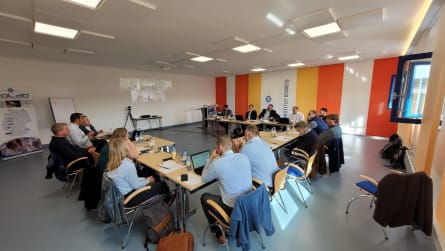The 101st meeting of the Central European Brewing Technology Analysis Commission (MEBAK) was recently held in Oberthulba and provided plenty of material for discussion as well as insights into current developments in the brewing industry. The meeting began with a warm welcome from the Managing Director of the Romeis Institute, Dipl.-Ing. Dimo Brandt, and Marcus Jentsch. Chairman Dr Zarnkow announced the participation of LM-Chem. Fuchs from the LGL in Würzburg, who joined the meeting later. Tobias Voß, M.Sc., from the Romeis Institute was also welcomed as a guest. Dr Zarnkow initiated the discussion on association matters. The farewell of two members, Dr Karel Sterba and Prof Dr Mehmet Coelhan, due to changes in their professional activities was discussed. MEBAK e.V. would like to thank them for their many years of active participation and wishes them all the best for the future!
Prof. Dr. May from the Institute of Oenology at Hochschule Geisenheim University gave a presentation and was then unanimously accepted as a new member. Prof Dr May gave an excellent presentation on the diversity of phenols in amphora-fermented white wines. It turned out that conventional HPLC analyses do not always provide the best results with regard to the phenol profile, but that simple spectrophotometric methods can be more effective. In particular, the combination of different techniques, such as the determination via 4-(dimethylamino)cinnamaldehyde, the precipitation of tannins using methyl cellulose and their subsequent determination and, of course, the determination of total phenols using Folin-Ciocalteu reagents, enable a detailed characterisation of the phenolic profile. Analyses of mash-fermented white wines showed significantly higher total phenol contents compared to classically fermented variants. Many thanks for the very interesting insights and welcome to the MEBAK expert group, Prof. Dr. May!
The working groups reported on their progress, including the Online, Raw Materials, Hops, WüBiMi, Microbiology, Water, GUP, Krüger-Anger and Sensor Technology working groups. Among other things, the working groups also reported on the further harmonisation and updating of analysis methods. In particular, the importance of taking account of scientific progress in the analytical methods was emphasised in order to ensure accurate and reliable results at all times. MEBAK works closely with international organisations such as the European Brewery Convention (EBC) to ensure that standards and methods are recognised and accepted worldwide.
Special mention should also be made of the fact that the new method for testing the purity of barley (ZoomAgri) can now be accessed in English and German in the online method collection. Image recognition software recognises characteristic morphological features on cereal grains, which are then used to identify varieties. A sample is captured using a high-resolution scanner, the image is then analysed online and evaluated with the help of artificial intelligence. Dr Reil from the WüBiBiMi working group reported on further updates to the method database, such as the enzymatic determination of ethanol, forced ageing, formaldehyde and the alcohol cold test. The Hops Working Group also reported on a planned update of the method for determining the bitterness units of beer and wort, as more complex sample matrices, such as those found in cold-hopped beers, pose new challenges for conventional methods. These activities show once again how important it is to offer online analysis methods in today's digital world. With online access, subscribers can always stay up to date.
To summarise, the 101st MEBAK meeting was an important step towards the continuous improvement and adaptation of brewing standards to the current developments and needs of the brewing industry. MEBAK remains committed to consolidating its role as an institution in the brewing industry and continuing to provide high quality analytical methods and standards for brewers and maltsters. The meeting ended with a positive outlook on future projects and challenges that MEBAK will address.
